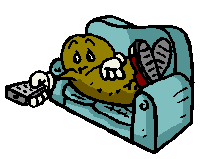9 Key Reasons for You and Your Family to Kill Your Television
by SixWise.com
For many people, coming home from work or school and turning on the TV
is as much a part of the daily routine as brushing teeth or walking the
dog-and a big part, at that. For the average American, watching TV consumes
four hours of each day. Four hours!
That means in one week, the typical American has spent over one entire
day in front of the tube. Out of one year, over 60 full days!
Imagine what else you could achieve with that precious time. Have projects
that you just can't find the time to do? Wish you could fit in more exercise,
time with your kids or spouse, time to read, or just more time to yourself?
Turn off the TV and you may find lots of "extra" time to do
them.
One of the best ways to prioritize where watching TV should rank in your
life - and to stay motivated to reduce TV time - is to create a simple
list of all the things that you (or your kids) need or have always wanted
to do but "never seem to have the time to do." (When you do
this, most people will notice how "Watch more TV" rarely lands
on that list!)
Rank the items you come up with and then dedicate yourself to achieving
them ... and keep the list right by the television (or by the remote
control) to remind you there are more important things in life whenever
the "TV craving" strikes.
To motivate you even more, here are 9 more key reasons to allow your
TV more time off, or even to give it a permanent vacation:
|

The average American watches four hours of TV each day-that's 28
hours a week, 60 days per year!
|
1. Keep Your Kids from Turning into Bullies.
Bullying is a major problem in schools today, and a study published in
the April 2005 issue of the Archives of Pediatrics & Adolescent Medicine
found that 4-year-olds who watched five hours of
TV a day were 25 percent more likely to become bullies than those
who watched no TV or only 3.2 hours a day. Furthermore, the kids who watched
the most TV had twice the risk of becoming bullies.
"Four-year-old kids in general are not watching "The Sopranos."
They're watching cartoons, but they're very violent. This is a major message
that parents need to be aware of," said Frederick J. Zimmerman, lead
author of the study.
2. The Unhealthy Influence of Ads, Especially Ads for the Unhealthy
Ever notice how many junk food ads air during Saturday morning cartoons
or how many pizza commercials come on during the evening? Does it trigger
a craving in you? It does for many people, and that's precisely what the
advertisers know will happen (which is why they keep spending increasing
dollars to air the ads). It's hard enough for adults to resist the urges
of junk food commercials, but for kids, it's even closer to impossible.
A child under the age of 8 often can't even tell the difference between
a TV commercial and a TV program, said Senator Tom Harkin in a speech
given at a joint conference of the American Advertising Federation, the
American Association of Advertising Agencies and the Association of National
Advertisers. He was referring to studies that have shown this to be the
case, but anyone who has raised children realizes this intuitively: kids
don't have the same developed faculties to tell the difference between
what is "spin" and what is "real."
"Corporate America ... spends $12 billion [on advertising aimed
at children] because that advertising works brilliantly because it persuades
children to demand-to the point of throwing temper tantrums, if necessary-a
regular diet of candy, cookies, sugary cereal, sodas, and all manner of
junk food," Harkin added. He urged the food and advertising industries
to stop targeting children with the ads.
|

Don't let too much TV turn you into a couch potato-get out, be
active and spend time with your family before it's too late!
|
3. Obesity and TV Go Together Like a Burger and Fries
The connection between obesity and TV is undeniable. First, there's the
junk food mentioned above-not only do the ads make you and your kids crave
it (and think it's a necessary part of a daily diet) but what goes better
with a night of TV watching on the couch than a bag of potato chips and
a soda? And time spent in front of the TV is time that is NOT spent being
physically active.
And the problem reaches all ages. 15 percent of American children and
teenagers are obese -- a higher rate than in any other industrialized
country. And according to Vicky Rideout of the Kaiser Family Foundation,
"Kids who watch more TV are more likely to be obese." She named
three things that amplify the link between TV watching and obesity:
- Kids snack more while watching TV (usually on junk food)
- Kids watching TV are exposed to marketing messages encouraging them
to eat junk food
- Research studies don't take into account all the "lower-level"
physical activity that kids who watch a lot of TV miss out on (such
as walking around the house looking for something to do)
4. Get to Know Your Loved Ones & Develop Stronger Relationships
Families who turn off the TV are able to have real conversations-the kind
that aren't rushed through during a commercial break or held half-heartedly
with one ear on a "reality" show.
Many people think of TV time as leisure time, but it can be rather isolating,
particularly when family members retreat to different rooms of the house
to watch different programs.
One fourth grade class at Angier School took the ultimate test: They,
along with their families, swore off TV and other forms of "electronic
entertainment" for one week. At the end, both students and parents
reported that their relationships were strengthened.
One boy wrote in his journal, "During the whole week, I was just
dying to play video games ... Now I think I have a stronger connection
with my parents, my dog and everyone else." And one parent told teacher
Dick Hanelin, "Now [my child] feels more present as a member of the
family."
5. Teach Kids to Solve Problems ... Peacefully
As teacher Dick Hanelin pointed out, characters on TV often use violence
to solve conflicts. "We need to encourage kids to find peaceful ways
of talking through and walking through a situation." And what better
way to do this than to turn off the TV and use the time to talk to your
kids about how they would handle certain problematic situations. Role-playing,
in which a parent pretends to start a conflict and the child responds
responsibly, works well, especially with younger kids.
|

Having more time to spend with your family is just one reason to
turn the TV off today.
|
6. Help Toddlers Learn to Talk
Infants have a hard time distinguishing spoken words from background noise,
unless the spoken words are much louder than the noise, said psychologist
Rochelle Newman, PhD, the director of the language perception and development
labs at the University of Maryland. This means that infants who are raised
around a lot of noise -- for instance in a home where the TV is always
on or in a noisy day care -- could take longer to learn to speak.
"This might delay the onset of speech," Newman says, referring
to noisy places. "Turning off the TV or radio, at least part of the
time, would be a good place to start."
7. Get More and Better ZZZZZZZZZs
According to a study in Pediatrics, kids in kindergarten through fourth
grade who watched as little as two hours of TV a night (remember that
the average American watches four hours a day) had significant sleep problems
including:
- Resisting going to bed
- Having trouble falling asleep
- Not sleeping as long
- Anxiety about sleep
- Daytime sleepiness
Sleep problems were the worst when there was a TV in the child's room.
Likewise, adults can benefit from taking the TV out of the bedroom. Watching
TV before bed stimulates the brain at a time when the brain should be
preparing for sleep, and staying up to watch a program could interfere
with your sleep pattern. Instead of using your bed to watch TV, use it
only for sleep and other bedroom activities.
8. Read More!
Instead of watching TV, why not pick up a good book? Research shows that
people who read a lot:
- Have better concentration
- Can process new information more easily
- See subtleties
- Understand how unrelated facts can fit into a whole
- Are more open to new ideas
- Can keep up better with new information in the workplace
- Develop an ability to understand how others think and feel
9. Do Something Beneficial for Yourself
When was the last time you got together with friends for dinner or flag
football, painted a picture, played Monopoly, wrote a poem, prayed or
meditated, planted flowers in your garden, took a bike ride, soaked in
a hot bubble bath, cooked a gourmet dinner, went to the gym or called
one of your old college buddies?
Take the time you would have spent watching TV to do something for yourself
that you haven't done in a long time, but should have. You'll likely find
your life really is more rewarding and worthwhile than any of the characters
on "The O.C."
Sources
WebMD
Health April 5, 2005
HealthDay
April 4, 2005
FoodNavigator
April 6, 2005
TownOnline
March 30, 2005
Seattle
Post Intelligencer March 21, 2005
Yale
New Haven Children's Hospital
Focus
on Your Child